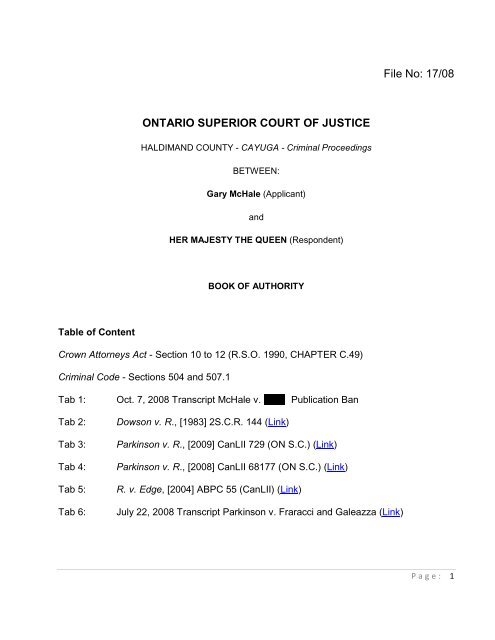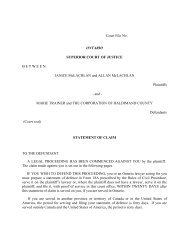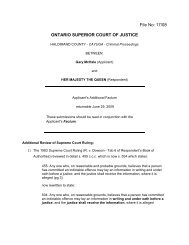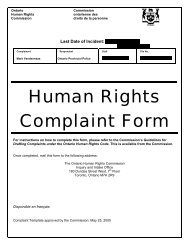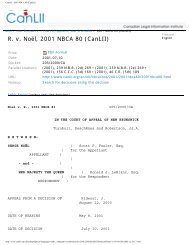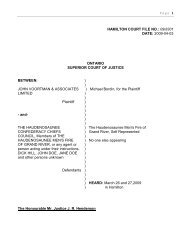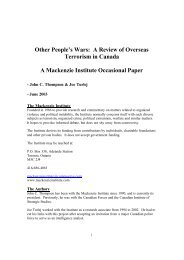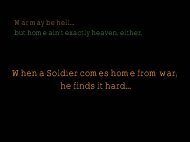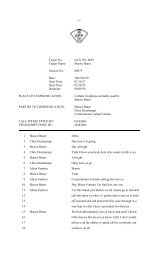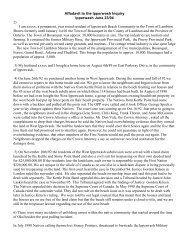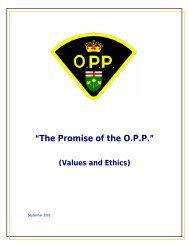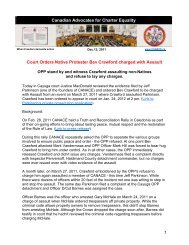Book of Authorities - Caledonia Wake Up Call
Book of Authorities - Caledonia Wake Up Call
Book of Authorities - Caledonia Wake Up Call
You also want an ePaper? Increase the reach of your titles
YUMPU automatically turns print PDFs into web optimized ePapers that Google loves.
File No: 17/08<br />
ONTARIO SUPERIOR COURT OF JUSTICE<br />
HALDIMAND COUNTY - CAYUGA - Criminal Proceedings<br />
BETWEEN:<br />
Gary McHale (Applicant)<br />
and<br />
HER MAJESTY THE QUEEN (Respondent)<br />
BOOK OF AUTHORITY<br />
Table <strong>of</strong> Content<br />
Crown Attorneys Act - Section 10 to 12 (R.S.O. 1990, CHAPTER C.49)<br />
Criminal Code - Sections 504 and 507.1<br />
Tab 1:<br />
Tab 2:<br />
Tab 3:<br />
Tab 4:<br />
Tab 5:<br />
Tab 6:<br />
Oct. 7, 2008 Transcript McHale v. FMK Publication Ban<br />
Dowson v. R., [1983] 2S.C.R. 144 (Link)<br />
Parkinson v. R., [2009] CanLII 729 (ON S.C.) (Link)<br />
Parkinson v. R., [2008] CanLII 68177 (ON S.C.) (Link)<br />
R. v. Edge, [2004] ABPC 55 (CanLII) (Link)<br />
July 22, 2008 Transcript Parkinson v. Fraracci and Galeazza (Link)<br />
Page: 1
Crown Attorneys Act<br />
R.S.O. 1990, CHAPTER C.49<br />
Attorney-General’s agent<br />
10. Every Crown Attorney and every provincial prosecutor is the agent <strong>of</strong> the Attorney<br />
General for the purposes <strong>of</strong> the Criminal Code (Canada). R.S.O. 1990, c. C.49, s. 10.<br />
Duties:<br />
11. The Crown Attorney shall aid in the local administration <strong>of</strong> justice and perform the<br />
duties that are assigned to Crown Attorneys under the laws in force in Ontario, and, without<br />
restricting the generality <strong>of</strong> the foregoing, every Crown Attorney shall,<br />
to examine informations, etc.<br />
(a) examine informations, examinations, depositions, recognizances, inquisitions and<br />
papers connected with <strong>of</strong>fences against the laws in force in Ontario that the provincial<br />
judges, justices <strong>of</strong> the peace and coroners are required to transmit to him or her, and, where<br />
necessary, cause such charges to be further investigated, and additional evidence to be<br />
collected, and sue out process to compel the attendance <strong>of</strong> witnesses and the production <strong>of</strong><br />
papers, so that prosecutions may not be delayed unnecessarily or fail through want <strong>of</strong> pro<strong>of</strong>;<br />
to conduct prosecutions<br />
(b) conduct, on the part <strong>of</strong> the Crown, preliminary hearings <strong>of</strong> indictable <strong>of</strong>fences and<br />
prosecutions for indictable <strong>of</strong>fences,<br />
(i) at the sittings <strong>of</strong> the Superior Court <strong>of</strong> Justice where no law <strong>of</strong>ficer <strong>of</strong> the Crown<br />
or other counsel has been appointed by the Attorney General,<br />
(ii) before provincial judges in summary trials <strong>of</strong> indictable <strong>of</strong>fences under the<br />
Criminal Code (Canada),<br />
in the same manner as the law <strong>of</strong>ficers <strong>of</strong> the Crown conduct similar prosecutions at the<br />
sittings <strong>of</strong> the Superior Court <strong>of</strong> Justice, and with the like rights and privileges, and attend to<br />
all criminal business at such courts;<br />
special Crown counsel<br />
(c) where a law <strong>of</strong>ficer <strong>of</strong> the Crown or other counsel has been appointed by the Attorney<br />
General, deliver to the Crown <strong>of</strong>ficer or other counsel all papers connected with the criminal<br />
business at the sittings <strong>of</strong> the Superior Court <strong>of</strong> Justice before the opening <strong>of</strong> the court and,<br />
if required, be present at the court and assist the Crown <strong>of</strong>ficer or other counsel;<br />
Page: 2
cases brought by private prosecutors<br />
(d) watch over cases conducted by private prosecutors and, without unnecessarily<br />
interfering with private individuals who wish in such cases to prosecute, assume wholly the<br />
conduct <strong>of</strong> the case where justice towards the accused seems to demand his or her<br />
interposition;…<br />
Provincial judges and justices to deliver informations, etc., to Crown Attorney<br />
12. Where a person is committed for trial to answer a criminal charge, the committing<br />
provincial judge shall deliver or cause to be delivered without delay to the Crown Attorney<br />
the informations, depositions, examinations, recognizances and papers connected with the<br />
charge, and the Crown Attorney is the “proper <strong>of</strong>ficer <strong>of</strong> the court by which the accused is to<br />
be tried” within the meaning <strong>of</strong> the committal for trial provisions <strong>of</strong> the Criminal Code<br />
(Canada) and, where an information has been laid before a justice <strong>of</strong> the peace, whether<br />
proceedings have been taken thereon or not, the justice shall deliver to the Crown Attorney<br />
all papers connected therewith on being required by the Crown Attorney so to do. R.S.O.<br />
1990, c. C.49, s. 12.<br />
---------------------------------<br />
Page: 3
Criminal Code, R.S.C. 1985, c. C-46<br />
In what cases justice may receive information<br />
504. Any one who, on reasonable grounds, believes that a person has committed an<br />
indictable <strong>of</strong>fence may lay an information in writing and under oath before a justice, and the<br />
justice shall receive the information, where it is alleged<br />
(a) that the person has committed, anywhere, an indictable <strong>of</strong>fence that may be tried in the<br />
province in which the justice resides, and that the person<br />
(i) is or is believed to be, or<br />
(ii) resides or is believed to reside,<br />
within the territorial jurisdiction <strong>of</strong> the justice;<br />
(b) that the person, wherever he may be, has committed an indictable <strong>of</strong>fence<br />
within the territorial jurisdiction <strong>of</strong> the justice;<br />
(c) that the person has, anywhere, unlawfully received property that was<br />
unlawfully obtained within the territorial jurisdiction <strong>of</strong> the justice; or<br />
(d) that the person has in his possession stolen property within the territorial<br />
jurisdiction <strong>of</strong> the justice.<br />
R.S., c. C-34, s. 455; R.S., c. 2(2nd Supp.), s. 5.<br />
--------------------<br />
Justice to hear informant and witnesses — public prosecutions<br />
507. (1) Subject to subsection 523(1.1), a justice who receives an information laid under<br />
section 504 by a peace <strong>of</strong>ficer, a public <strong>of</strong>ficer, the Attorney General or the Attorney<br />
General’s agent, other than an information laid before the justice under section 505, shall,<br />
except if an accused has already been arrested with or without a warrant,<br />
(a) hear and consider, ex parte,<br />
(i) the allegations <strong>of</strong> the informant, and<br />
(ii) the evidence <strong>of</strong> witnesses, where he considers it desirable or necessary to do<br />
so; and<br />
(b) where he considers that a case for so doing is made out, issue, in accordance with this<br />
section, either a summons or a warrant for the arrest <strong>of</strong> the accused to compel the accused<br />
Page: 4
to attend before him or some other justice for the same territorial division to answer to a<br />
charge <strong>of</strong> an <strong>of</strong>fence.<br />
Process compulsory<br />
(2) No justice shall refuse to issue a summons or warrant by reason only that the alleged<br />
<strong>of</strong>fence is one for which a person may be arrested without warrant.<br />
Procedure when witnesses attend<br />
(3) A justice who hears the evidence <strong>of</strong> a witness pursuant to subsection (1) shall<br />
(a) take the evidence on oath; and<br />
(b) cause the evidence to be taken in accordance with section 540 in so far as that<br />
section is capable <strong>of</strong> being applied.<br />
Summons to be issued except in certain cases<br />
(4) Where a justice considers that a case is made out for compelling an accused to attend<br />
before him to answer to a charge <strong>of</strong> an <strong>of</strong>fence, he shall issue a summons to the accused<br />
unless the allegations <strong>of</strong> the informant or the evidence <strong>of</strong> any witness or witnesses taken in<br />
accordance with subsection (3) discloses reasonable grounds to believe that it is necessary<br />
in the public interest to issue a warrant for the arrest <strong>of</strong> the accused.<br />
Referral when private prosecution<br />
--------------------<br />
507.1 (1) A justice who receives an information laid under section 504, other than an<br />
information referred to in subsection 507(1), shall refer it to a provincial court judge or, in<br />
Quebec, a judge <strong>of</strong> the Court <strong>of</strong> Quebec, or to a designated justice, to consider whether to<br />
compel the appearance <strong>of</strong> the accused on the information.<br />
Summons or warrant<br />
(2) A judge or designated justice to whom an information is referred under subsection (1)<br />
and who considers that a case for doing so is made out shall issue either a summons or<br />
warrant for the arrest <strong>of</strong> the accused to compel him or her to attend before a justice to<br />
answer to a charge <strong>of</strong> the <strong>of</strong>fence charged in the information.<br />
Conditions for issuance<br />
(3) The judge or designated justice may issue a summons or warrant only if he or she<br />
(a) has heard and considered the allegations <strong>of</strong> the informant and the evidence <strong>of</strong><br />
witnesses;<br />
Page: 5
(b) is satisfied that the Attorney General has received a copy <strong>of</strong> the information;<br />
(c) is satisfied that the Attorney General has received reasonable notice <strong>of</strong> the<br />
hearing under paragraph (a); and<br />
(d) has given the Attorney General an opportunity to attend the hearing under<br />
paragraph (a) and to cross-examine and call witnesses and to present any relevant<br />
evidence at the hearing.<br />
Appearance <strong>of</strong> Attorney General<br />
(4) The Attorney General may appear at the hearing held under paragraph (3)(a) without<br />
being deemed to intervene in the proceeding.<br />
Information deemed not to have been laid<br />
(5) If the judge or designated justice does not issue a summons or warrant under subsection<br />
(2), he or she shall endorse the information with a statement to that effect. Unless the<br />
informant, not later than six months after the endorsement, commences proceedings to<br />
compel the judge or designated justice to issue a summons or warrant, the information is<br />
deemed never to have been laid.<br />
Information deemed not to have been laid — proceedings commenced<br />
(6) If proceedings are commenced under subsection (5) and a summons or warrant is not<br />
issued as a result <strong>of</strong> those proceedings, the information is deemed never to have been laid.<br />
New evidence required for new hearing<br />
(7) If a hearing in respect <strong>of</strong> an <strong>of</strong>fence has been held under paragraph (3)(a) and the judge<br />
or designated justice has not issued a summons or a warrant, no other hearings may be<br />
held under that paragraph with respect to the <strong>of</strong>fence or an included <strong>of</strong>fence unless there is<br />
new evidence in support <strong>of</strong> the allegation in respect <strong>of</strong> which the hearing is sought to be<br />
held.<br />
Page: 6


